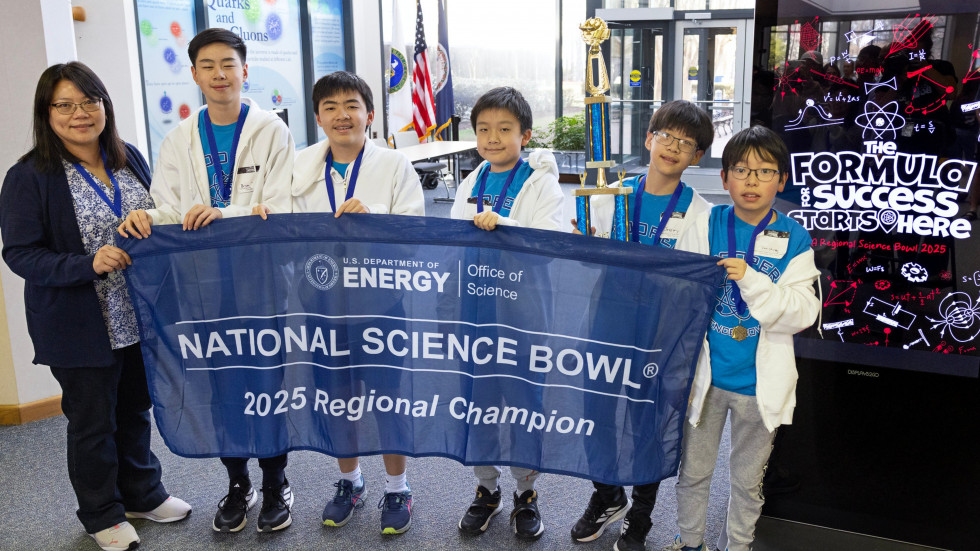Jefferson Lab photo by Aileen Devlin
Fairfax County Public Schools sends second team to 2025 DOE National Science Bowl®
NEWPORT NEWS, VA – A battle of the minds played out at the U.S. Department of Energy's Thomas Jefferson National Accelerator Facility as middle school teams across Virginia went head-to-head in the 2025 Virginia Regional Middle School Science Bowl.
The tournament featured 11 teams from eight Virginia middle schools. Teams competed in a double-elimination tournament, with students answering questions about biology, chemistry, physics, Earth science, energy and math.
After a full day of toss-up questions, bonus rounds and nonstop buzzers, Cooper Middle School Team 1 faced off against their own classmates, Cooper Middle School Team 2. Team 2 had one loss going into a dramatic final round. They failed to get points on the board early enough, and Team 1 demonstrated incredible skill and speed from the start. In the end, Team 1 claimed the championship title and earned a spot to compete at the upcoming DOE National Science Bowl.
"They worked really hard this season, and I saw their teamwork grow so much," said Joyce Ku, Cooper Middle School Team 1 coach. "I loved watching them demonstrate that teamwork today and have so much fun together in every game."
Alongside the Science Bowl, students took on the Cyber Challenge, a competition hosted by DOE’s Lawrence Livermore National Laboratory. They tackled coding, cybersecurity and computer science puzzles, testing their problem-solving skills in a new way.
"The Cyber Challenge encourages students to think critically and tackle problems that go beyond typical science and math competitions," said Carol McKisson, Jefferson Lab Science Education administrator. "These challenges help develop cybersecurity skills and knowledge."
The Science Bowl, launched in 1991 by the Department of Energy, is one of the nation's largest academic competitions. More than 344,000 students have participated since its inception, competing in a fast-paced, buzzer-style format that encourages teamwork and critical thinking.
"This is my first time volunteering at the Science Bowl, and I am so impressed," said Xavier Gardner, Jefferson Lab Communications intern and first-time event volunteer. "One minute, they're answering a chemistry question; the next, they're solving a physics problem. It had the energy of a Final Four matchup, and I'll definitely be back next year."
2025 Virginia Regional Middle School Science Bowl Winners
-
First place: Cooper Middle School Team 1 (McLean)
-
Second place: Cooper Middle School Team 2 (McLean)
-
Third place: Longfellow Middle School (Falls Church)
As regional champions, Cooper Middle School Team 1 will compete against the other top middle school teams nationwide. The National Science Bowl features several days of competition, STEM activities and exclusive science-focused experiences.
For more information about the DOE National Science Bowl®, visit National Science Bowl | Department of Energy.
For sample Science Bowl questions, visit NSB Middle School Sample Questio... | U.S. DOE Office of Science (SC).
For additional event photos, visit 2025 Middle School Science Bowl | Team members from Cooper M… | Flickr
Contact Michelle Alvarez, Jefferson Lab Communications Office, malvarez@jlab.org


